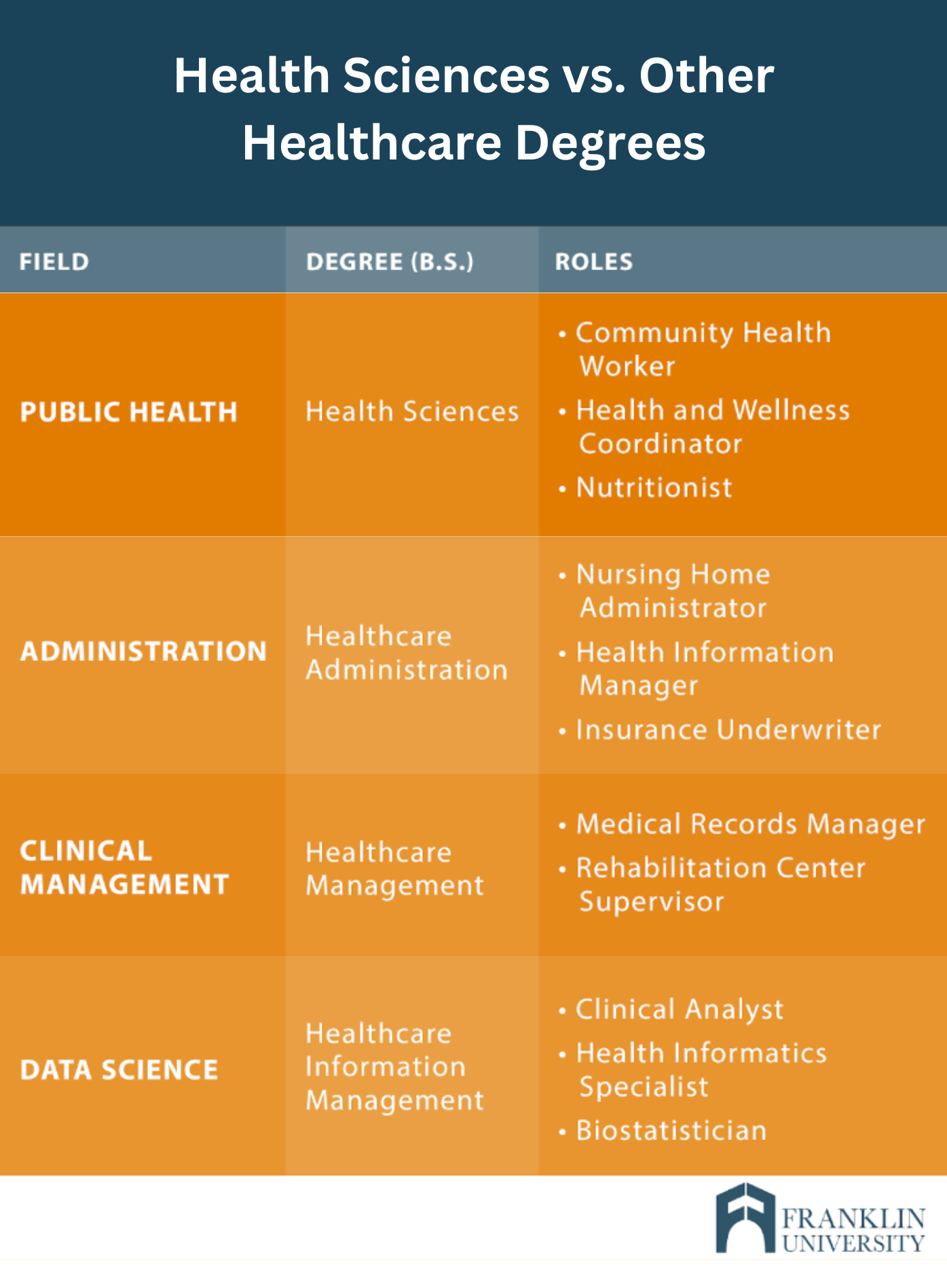Request Information
We're Sorry
There was an unexpected error with the form (your web browser was unable to retrieve some required data from our servers). This kind of error may occur if you have temporarily lost your internet connection. If you're able to verify that your internet connection is stable and the error persists, the Franklin University Help Desk is available to assist you at helpdesk@franklin.edu, 614.947.6682 (local), or 1.866.435.7006 (toll free).
Just a moment while we process your submission.

What Can You Do with a Health Sciences Degree? (5 Top Jobs + 4 Unexpected Paths)
So, you've decided you want to work in healthcare and make a difference in your community and your future. You’ve landed on the idea of earning a bachelor’s degree in health sciences.
Good choice! Why? Because the U.S. Bureau of Labor Statistics (BLS) predicts that for health sciences majors, there will be 2 million new jobs by 2031.
All that’s left to do now is to make sure that a health sciences degree will open up the career opportunities you’re looking for. So, here’s a look at five of the top jobs in health sciences, along with four career paths that, perhaps, you haven’t yet thought of.
But first, it can help to understand more about health science degrees.
What Is a Health Sciences Degree?
Health sciences is a diverse, interdisciplinary field that spans biology, psychology, sociology, business, policy and ethics. While you can expect to work in the healthcare industry, a degree in health sciences is not the same as other healthcare and public administration degrees.
People with a degree in health science tend to focus on applying the research-based knowledge of illnesses, diseases and interventions to improve health and well-being.
Common healthcare degrees (and Who They’re For)
Compared to other bachelor’s degrees in healthcare, a health sciences degree has the greatest focus on the natural sciences. The right degree program also will help you learn how to best engage with patients and staff in both clinical and non-clinical settings to promote education and positive outcomes.
It can help to have a better understanding of health sciences as a career field by comparing it to other healthcare-related degrees and roles. For example, career positions for health sciences include health and wellness coordinator and nutritionist, whereas a degree in healthcare administration could lead to a career as an insurance underwriter or health information manager.
Graphic: change this graphic to be more of a comparison by highlighting health sciences first.
New Title: Health Sciences vs. Other Healthcare Degrees

Advance your career in Healthcare Administration while you advance patient care. Download your free career guide.
Health Sciences Degree: 4 Top Jobs
1. Community Health Worker/Health Education Specialist
- Median Salary: $48,860
- Projected Growth: 12%
- Health educators educate and promote health and wellness behaviors. They may help patients with diabetes learn how to test their blood sugar, train medical staff on how to better communicate with patients or conduct community health screenings. They work in a variety of settings, including nonprofits, government agencies, small businesses and colleges.
2. Athletic Trainer
- Median Salary: $48,420
- Projected Growth: 17%
- Athletic trainers typically work for sports teams at the professional, university or secondary school level. They specialize in preventing and treating muscle and bone injuries and illnesses.
3. Dietitian/Nutritionist
- Median Salary: $61,650
- Projected Growth: 7%
- Dietitians and nutritionists help patients manage diseases and stay healthy through quality nutrition. They’re often found working in nursing homes, cafeterias, clinics, schools and local government.
4. Clinical Lab Technologist
- Median Salary: $57,800
- Projected Growth: 7%
- Clinical laboratory technologists usually work in hospitals, physicians’ offices and medical and diagnostic labs. They perform a variety of laboratory tests to help in the prevention, diagnosis and treatment of disease.
Health Science Job Skills: What Will You Learn?
While each undergraduate health sciences degree program is unique, you can, in general, expect a health science degree program to be interdisciplinary. That means you’ll likely get a broad understanding of disease processes and prevention. You’ll also gain a greater understanding of the research, education and communication techniques that are required to create, implement and promote health programs that impact individuals and communities.
One of the goals of the health science profession is to bring healthcare to people in settings where these services can be more cost-effective and impactful than, say, a hospital. These settings include in neighborhoods, schools, business and communities. Which is why you’ll want your health sciences degree to help you master such topics and skills as ethics, cultural diversity and interpersonal communication.
When considering where to earn your B.S. Health Sciences, look for a comprehensive health sciences program that includes the following:
Classroom instruction of core skills.
Look for a curriculum that includes courses in biology and anatomy, scientific analysis and research methods, medical terminology, grant writing and public administration. These courses will help you learn how to analyze the benefits of organizational-level policies, create visual data to communicate key information to stakeholders and develop strategies to alleviate health and wellness obstacles.
Potential to qualify for licensure.
You’ll want a degree program that equips you with industry-aligned knowledge and skills, as well as prepares you to sit for the Certified Health Education Specialist exam administered through the National Commission for Health Education Credentialing (NCHEC). Earning your CHE is another way to demonstrate your understanding of health education roles and your competency in health education and health promotion.
Hands-on experience with real-world problems.
Most top health sciences programs include a practicum component so you can apply what you learn to an actual issue or problem within the field. This could include field experience, service learning, civic engagement or an internship/apprenticeship.
What Can You Do with a Health Sciences Degree? 4 Unexpected Paths
1. Start a new career.
For most jobs in the field, including health educators, medical records technicians, and health and wellness coordinators, a bachelor’s degree gives you a foot in the door to practical, on-the-job experience.
2. Advance to a managerial role.
If you’re already working in a healthcare setting, a health sciences degree can increase your chances of promotion to more responsibility and higher pay.
3. Continue to grad school.
A health sciences bachelor’s degree can be a stepping stone to many in-demand and rewarding occupations that require a master’s degree: speech language pathologist, occupational therapist and bioinformatics scientist.
4. Make a difference.
If you’re passionate about health and wellness and want to make a difference in the world, a health sciences degree will prepare you to better the lives of those around you.
5 Tips to Choosing the Right Health Sciences Degree Program
1. Research different programs.
Do you have a special interest in nutrition, community health or emergency planning? Are you employed at an occupational or physical therapy office and looking to expand your role and expertise? Programs vary greatly in scope and specialization, so look for a program that offers the classes and faculty that support your unique needs and specific interests.
2. Ask about transfer credits.
Do you have some classes already to your credit? Are you already working in the healthcare field? Many schools offer credit for prior academic or work experience, as well as for some professional training and certifications. Not only can transfer credit save you money, it could help you graduate faster. Just be sure to check your school’s transfer policy before enrolling, so you don’t miss out on leveraging what you already know.
3. Factor in flexibility.
Going back to school full time on a college campus is not possible for a lot of people–especially if you’re juggling work and family life along with your classes. So, look for a program that has flexible scheduling, such as evening, weekend or online classes.
4. Talk with your employer about tuition reimbursement.
Find out if your organization offers tuition reimbursement for some or all of your education costs. Some companies require employees to pay for tuition upfront. Others don’t. So, be sure you fully understand what your employer expects from you, as well as any other terms and conditions attached to the benefit.
5. Check the numbers.
What percentage of your school’s program graduates go on to work in the field? What is the median salary of recent graduates? These statistics are often easily found online with a simple search. Choosing a school with a high success rate can help ensure that your college investment will be successful, too.
Why a Health Sciences Degree Could Be Right for You
The need for well-trained, innovative health science professionals working at every level will continue to be essential to creating and maintaining a healthy, thriving population. So, whether you’re headed to college for the first time or in a career transition, a health sciences degree can open up a lot of exciting opportunities within the always-changing and ever-growing healthcare industry.





